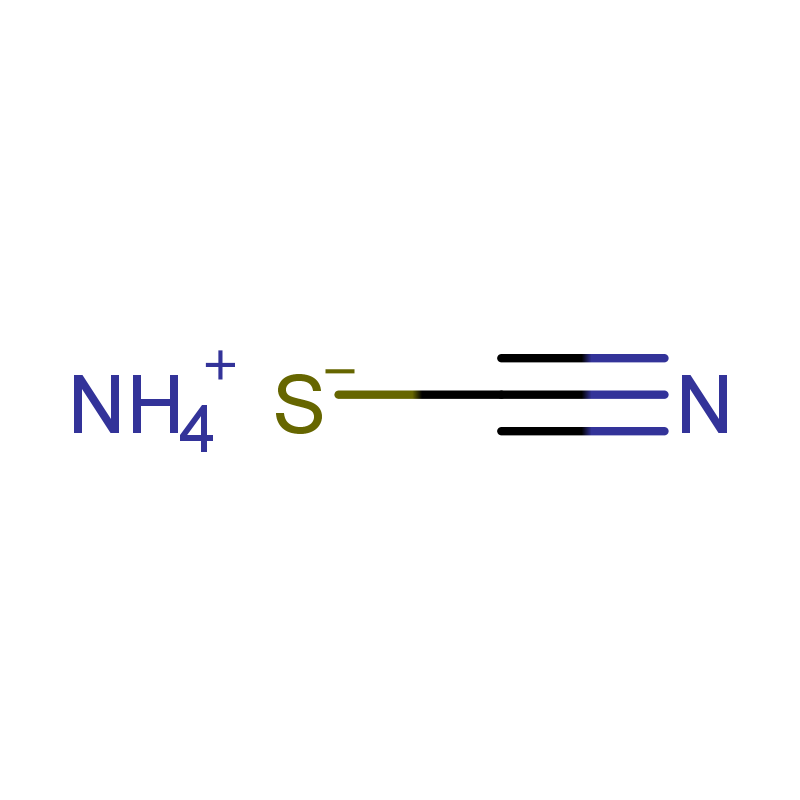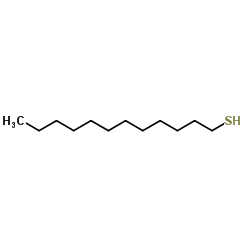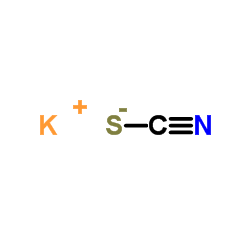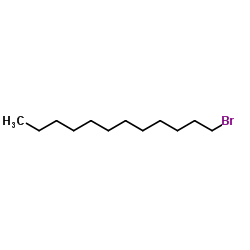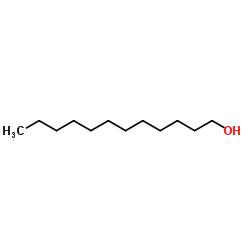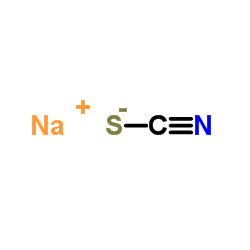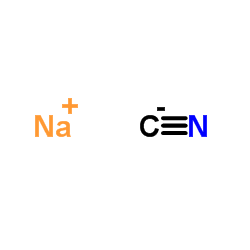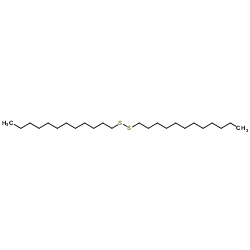765-15-1
| 中文名 | 正十二烷基硫代异氰酸酯 |
|---|---|
| 英文名 | dodecyl thiocyanate |
| 中文别名 | 正十二烷基硫氰酸酯 |
| 英文别名 |
Lauryl rhodanate
Lorol thiocyanate MFCD00019773 LORO 1-Dodecyl thiocyanate Thiocyanic acid,dodecyl ester Dodecylthiocyanat Dodecane,1-thiocyanato Lauryl thiocyanate n-dodecyl thiocyante Laurylrhodanide n-Dodecyl thiocyanate Dodecylrhodanid EINECS 212-142-2 Thiocyansaeure-dodecylester |
| 密度 | 0.896 |
|---|---|
| 沸点 | 180ºC 18mm |
| 分子式 | C13H25NS |
| 分子量 | 227.40900 |
| 精确质量 | 227.17100 |
| PSA | 49.09000 |
| LogP | 5.12158 |
| 折射率 | 1.468 |
| 储存条件 | 保持容器密封,放入紧密的出藏器内,储存在阴凉,干燥的地方 |
| 稳定性 | 常温常压下稳定,避免氧化物 酸接触 |
| 分子结构 | 1、 摩尔折射率:70.18 2、 摩尔体积(m3/mol):250.4 3、 等张比容(90.2K):608.3 4、 表面张力(dyne/cm):34.7 5、 介电常数: 6、 偶极距(10 -24cm 3): 7、 极化率:27.82 |
| 计算化学 | 1.疏水参数计算参考值(XlogP):6.5 2.氢键供体数量:0 3.氢键受体数量:2 4.可旋转化学键数量:11 5.互变异构体数量:无 6.拓扑分子极性表面积49.1 7.重原子数量:15 8.表面电荷:0 9.复杂度:159 10.同位素原子数量:0 11.确定原子立构中心数量:0 12.不确定原子立构中心数量:0 13.确定化学键立构中心数量:0 14.不确定化学键立构中心数量:0 15.共价键单元数量:1 |
| 更多 | 1. 性状:未确定 2. 密度(g/mL,25/4℃):0,896 g/cm3 3. 相对蒸汽密度(g/mL,空气=1):未确定 4. 熔点(ºC):未确定 5. 沸点(ºC,常压):未确定 6. 沸点(ºC, 18mmHg):180°C 7. 折射率:未确定 8. 闪点(ºC, 18mm):180°C 9. 比旋光度(º):未确定 10. 自燃点或引燃温度(ºC):未确定 11. 蒸气压(kPa,25ºC):未确定 12. 饱和蒸气压(kPa,60ºC):未确定 13. 燃烧热(KJ/mol):未确定 14. 临界温度(ºC):未确定 15. 临界压力(KPa):未确定 16. 油水(辛醇/水)分配系数的对数值:未确定 17. 爆炸上限(%,V/V):未确定 18. 爆炸下限(%,V/V):未确定 19. 溶解性:未确定 |
|
Section1. IDENTIFICATION OF THE SUBSTANCE/MIXTURE Product identifiers Product name: DODECYL THIOCYANATE CAS-No.: 765-15-1 Relevant identified uses of the substance or mixture and uses advised against Identified uses: Laboratory chemicals, Manufacture of substances Section2. HAZARDS IDENTIFICATION Classification of the substance or mixture Classification according to Regulation (EC) No 1272/2008 [EU-GHS/CLP] Skin irritation (Category 2) Serious eye damage (Category 1) Specific target organ toxicity - single exposure (Category 3) Classification according to EU Directives 67/548/EEC or 1999/45/EC Irritating to respiratory system and skin. Risk of serious damage to eyes. Label elements Labelling according Regulation (EC) No 1272/2008 [CLP] Pictogram Signal wordDanger Hazard statement(s) H315Causes skin irritation. H318Causes serious eye damage. H335May cause respiratory irritation. Precautionary statement(s) P261Avoid breathing dust. P280Wear protective gloves/ eye protection/ face protection. P305 + P351 + P338IF IN EYES: Rinse cautiously with water for several minutes. Remove contact lenses, if present and easy to do. Continue rinsing. Supplemental Hazardnone Statements According to European Directive 67/548/EEC as amended. Hazard symbol(s) R-phrase(s) R37/38Irritating to respiratory system and skin. R41Risk of serious damage to eyes. S-phrase(s) S26In case of contact with eyes, rinse immediately with plenty of water and seek medical advice. S39Wear eye/face protection. Other hazards - none Section3. COMPOSITION/INFORMATION ON INGREDIENTS Substances Formula: C13H25NS Molecular Weight: 227,42 g/mol ComponentConcentration DODECYL THIOCYANATE CAS-No.765-15-1- Section4. FIRST AID MEASURES Description of first aid measures General advice Consult a physician. Show this safety data sheet to the doctor in attendance. If inhaled If breathed in, move person into fresh air. If not breathing, give artificial respiration. Consult a physician. In case of skin contact Wash off with soap and plenty of water. Consult a physician. In case of eye contact Rinse thoroughly with plenty of water for at least 15 minutes and consult a physician. If swallowed Never give anything by mouth to an unconscious person. Rinse mouth with water. Consult a physician. Most important symptoms and effects, both acute and delayed To the best of our knowledge, the chemical, physical, and toxicological properties have not been thoroughly investigated. Indication of any immediate medical attention and special treatment needed no data available Section5. FIREFIGHTING MEASURES Extinguishing media Suitable extinguishing media Use water spray, alcohol-resistant foam, dry chemical or carbon dioxide. Special hazards arising from the substance or mixture Carbon oxides, nitrogen oxides (NOx), Sulphur oxides Advice for firefighters Wear self contained breathing apparatus for fire fighting if necessary. Further information no data available Section6. ACCIDENTAL RELEASE MEASURES Personal precautions, protective equipment and emergency procedures Use personal protective equipment. Avoid dust formation. Avoid breathing vapors, mist or gas. Ensure adequate ventilation. Evacuate personnel to safe areas. Avoid breathing dust. Environmental precautions Do not let product enter drains. Methods and materials for containment and cleaning up Pick up and arrange disposal without creating dust. Sweep up and shovel. Keep in suitable, closed containers for disposal. Reference to other sections For disposal see section 13. Section7. HANDLING AND STORAGE Precautions for safe handling Avoid contact with skin and eyes. Avoid formation of dust and aerosols. Provide appropriate exhaust ventilation at places where dust is formed. Conditions for safe storage, including any incompatibilities Store in cool place. Keep container tightly closed in a dry and well-ventilated place. Specific end uses no data available Section8. EXPOSURE CONTROLS/PERSONAL PROTECTION Control parameters Components with workplace control parameters Exposure controls Appropriate engineering controls Handle in accordance with good industrial hygiene and safety practice. Wash hands before breaks and at the end of workday. Personal protective equipment Eye/face protection Face shield and safety glasses Use equipment for eye protection tested and approved under appropriate government standards such as NIOSH (US) or EN 166(EU). Skin protection Handle with gloves. Gloves must be inspected prior to use. Use proper glove removal technique (without touching glove's outer surface) to avoid skin contact with this product. Dispose of contaminated gloves after use in accordance with applicable laws and good laboratory practices. Wash and dry hands. The selected protective gloves have to satisfy the specifications of EU Directive 89/686/EEC and the standard EN 374 derived from it. Body Protection Complete suit protecting against chemicals, The type of protective equipment must be selected according to the concentration and amount of the dangerous substance at the specific workplace. Respiratory protection Where risk assessment shows air-purifying respirators are appropriate use a full-face particle respirator type N100 (US) or type P3 (EN 143) respirator cartridges as a backup to engineering controls. If the respirator is the sole means of protection, use a full-face supplied air respirator. Use respirators and components tested and approved under appropriate government standards such as NIOSH (US) or CEN (EU). Section9. PHYSICAL AND CHEMICAL PROPERTIES Information on basic physical and chemical properties a) AppearanceForm: solid b) Odourno data available c) Odour Thresholdno data available d) pHno data available e) Melting point/freezingno data available point f) Initial boiling point and no data available boiling range g) Flash pointno data available h) Evaporation rateno data available i) Flammability (solid, gas) no data available j) Upper/lowerno data available flammability or explosive limits k) Vapour pressureno data available l) Vapour densityno data available m) Relative densityno data available n) Water solubilityno data available o) Partition coefficient: n- log Pow: 5,679 octanol/water p) Autoignitionno data available temperature q) Decompositionno data available temperature r) Viscosityno data available s) Explosive propertiesno data available t) Oxidizing propertiesno data available Other safety information no data available Section10. STABILITY AND REACTIVITY Reactivity no data available Chemical stability no data available Possibility of hazardous reactions no data available Conditions to avoid no data available Incompatible materials Strong oxidizing agents Hazardous decomposition products Section11. TOXICOLOGICAL INFORMATION Information on toxicological effects Acute toxicity no data available Inhalation: no data available Skin corrosion/irritation no data available Serious eye damage/eye irritation no data available Respiratory or skin sensitization no data available Germ cell mutagenicity Carcinogenicity IARC:No component of this product present at levels greater than or equal to 0.1% is identified as probable, possible or confirmed human carcinogen by IARC. Reproductive toxicity Specific target organ toxicity - single exposure May cause respiratory irritation. Specific target organ toxicity - repeated exposure no data available Aspiration hazard no data available Potential health effects InhalationMay be harmful if inhaled. Causes respiratory tract irritation. IngestionMay be harmful if swallowed. SkinMay be harmful if absorbed through skin. Causes skin irritation. EyesCauses eye burns. Signs and Symptoms of Exposure To the best of our knowledge, the chemical, physical, and toxicological properties have not been thoroughly investigated. Additional Information RTECS: XK9625000 Section12. ECOLOGICAL INFORMATION Toxicity no data available Persistence and degradability no data available Bioaccumulative potential no data available Mobility in soil no data available Results of PBT and vPvB assessment no data available Other adverse effects no data available Section13. DISPOSAL CONSIDERATIONS Waste treatment methods Product Offer surplus and non-recyclable solutions to a licensed disposal company. Dissolve or mix the material with a combustible solvent and burn in a chemical incinerator equipped with an afterburner and scrubber. Contaminated packaging Dispose of as unused product. Section14. TRANSPORT INFORMATION UN number ADR/RID: -IMDG: -IATA: - UN proper shipping name ADR/RID: Not dangerous goods IMDG: Not dangerous goods IATA:Not dangerous goods Transport hazard class(es) ADR/RID: -IMDG: -IATA: - Packaging group ADR/RID: -IMDG: -IATA: - Environmental hazards ADR/RID: noIMDG Marine pollutant: noIATA: no Special precautions for user no data available Section15. REGULATORY INFORMATION This safety datasheet complies with the requirements of Regulation (EC) No. 1907/2006. Safety, health and environmental regulations/legislation specific for the substance or mixture no data available Chemical Safety Assessment no data available Section16. OTHER INFORMATION Further information Copyright 2011 Co. License granted to make unlimited paper copies for internal use only. The above information is believed to be correct but does not purport to be all inclusive and shall be used only as a guide. The information in this document is based on the present state of our knowledge and is applicable to the product with regard to appropriate safety precautions. It does not represent any guarantee of the properties of the product. Co., shall not be held liable for any damage resulting from handling or from contact with the above product. See reverse side of invoice or packing slip for additional terms and conditions of sale. |
|
毒理学数据: 1、急性毒性:大鼠口经LD50:1250mg/kg 2、急性毒性:小鼠腹腔LD50:933mg/kg 3、急性毒性:小鼠皮下LD50:17800mg/kg 生态学数据: 对水是稍微有害的,不要让未稀释或大量的产品接触地下水,水道或者污水系统,若无政府许可,勿将材料排入周围环境 CHEMICAL IDENTIFICATION
HEALTH HAZARD DATAACUTE TOXICITY DATA
|
| 风险声明 (欧洲) | R22;R32;R36/38 |
|---|---|
| 安全声明 (欧洲) | S26-S36/37/39 |
| RTECS号 | XK9625000 |
| 海关编码 | 2930909090 |
|
~93% 
765-15-1 |
| 文献:Iranpoor, Nasser; Firouzabadi, Habib; Shaterian, Hamid Reza Tetrahedron Letters, 2002 , vol. 43, # 18 p. 3439 - 3441 |
|
~90% 
765-15-1 |
| 文献:Kodomari, Mitsuo; Kuzuoka, Tetsuo; Yoshitomi, Suehiko Synthesis, 1983 , # 2 p. 141 - 142 |
|
~74% 
765-15-1 |
| 文献:Maeda; Kawaguchi; Masui; Ohmori Chemical and Pharmaceutical Bulletin, 1990 , vol. 38, # 5 p. 1389 - 1391 |
|
~% 
765-15-1 |
| 文献:US1963100 , ; |
|
~10% 
765-15-1 |
| 文献:Harrison, Charles R.; Hodge, Philip Synthesis, 1980 , # 4 p. 299 - 301 |
|
~% 
765-15-1 |
| 文献:US1963100 , ; |
|
~% 
765-15-1 |
| 文献:US2462433 , ; |
| 上游产品 7 | |
|---|---|
| 下游产品 5 | |
| 海关编码 | 2930909090 |
|---|---|
| 中文概述 | 2930909090. 其他有机硫化合物. 增值税率:17.0%. 退税率:13.0%. 监管条件:无. 最惠国关税:6.5%. 普通关税:30.0% |
| 申报要素 | 品名, 成分含量, 用途 |
| Summary | 2930909090. other organo-sulphur compounds. VAT:17.0%. Tax rebate rate:13.0%. . MFN tariff:6.5%. General tariff:30.0% |


